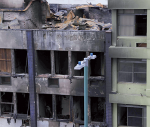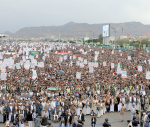You are here
Not Islamic terror
Jun 14,2016 - Last updated at Jun 14,2016
It has been described as the worst mass shooting in America’s history. At least 50 people were killed and 53 were injured when an armed assailant opened fire early Sunday in a crowded nightclub in the Florida city of Orlando.
The carnage went on for three hours before police officers killed the suspect.
Mass shootings are not unprecedented in America. In fact, between this latest attack and early 2011, at least 20 mass shootings took place, targeting schools, universities, cinemas, shopping malls and other spaces.
The majority was blamed on deranged, mentally disturbed, disgruntled and hateful individuals. In many cases there was no apparent motive
The Sunday killing spree reignited the debate over gun control laws in the US and that debate will continue for a long time.
But the Orlando attack was unique. A few hours after it happened, the police released the name of the alleged assailant: New York State-born, US citizen Omar Mateen, 29, of Afghan decent.
This immediately pointed to the possibility that this was a terrorist act and was politically and religiously motivated.
Coming only six months after the San Bernardino massacre, where two attackers, US-born Syed Rizwan Farook and Pakistani national Tashfeen Malik, killed 14 and injured 22 in a community centre, the media shifted attention to Islamic radicalism and the connection to Daesh.
Mateen was interviewed twice by the Federal Bureau of Investigation (FBI) in 2013 because of his apparent sympathy for Daesh, but was never charged.
President Barack Obama, in his initial response, made no reference to Daesh and described the attack as “an act of terror and an act of hate”.
Right-wing media rebuked him for failing to mention “radical Islam” and the ongoing US-led war against Daesh in the Middle East.
Conservative pundits and officials rejected the claim that this incident had to do with loose gun-control laws in the US.
It was claimed that Mateen had called the police prior to his attack and pledged allegiance to Daesh and its leader. But his father said his son had no religious leanings and his former wife said he was mentally ill, abusive and was prone to violence.
And despite the fact that a Daesh associated news website alleged that Mateen was one of its fighters, the FBI is yet to provide evidence that he was recruited by or had connections to the militant group.
In any case, the bloody attack has shaken Americans.
Presumptive Republican presidential nominee Donald Trump was quick to reiterate his controversial promise to ban Muslims from entering the US. He also condemned his Democratic rival, Hillary Clinton, for refusing to mention radical Islam.
In the midst of a heated presidential campaign, this terrible crime will further boost Trump’s racist and divisive rhetoric.
It will certainly give Islamophobes fresh ammunition to attack the religion and its followers.
Labelling is important for the right wing; to associate such attacks with “radical Islam” will intensify pressure on the Democratic candidate, and Obama, who shied away from using the term so far.
But just like any religion and faith, there are fanatics who adopt their own absurd interpretation and commit horrific acts against others.
This does not mean that the religion itself is to blame.
One can talk about radical Christians and extremist Jews, but it is inconceivable to associate these religions with fanaticism and violence.
Few have taken the challenge to make this point clear.
His Majesty King Abdullah was the first to call Daseh militants “khawarej”, or outlaws, who have nothing to do with the religion of more than a billion people all over the globe.
They are radicals, fanatics, extremists and criminals, and their association with mainstream Islam is easily refuted.
The majority of Daesh victims are in fact Muslims.
Mateen may turn out to be a lone wolf who wanted to link his crime to a cause.
Yes, he is Muslim, but the perpetrators of most mass shootings in the US over the past 50 years were not. Some had political, others had religious motives, but their acts cannot be used to judge a race, a religion or even some political ideologies.
Still, the Orlando and San Bernardino incidents focused attention on the repercussions of the war on Daesh, in particular, and the global war on terrorism, in general.
The possibility that religiously motivated radicals are carrying out a proxy war inside the US cannot be discounted.
The recent Paris and Brussels attacks underline the dangers we all face in today’s complex world.
This is a war against radicalism, no matter the label. It is a war against outlaws and criminals.
The ideology, if it can be called that, will appeal to a few disturbed individuals in the US and other countries. But it should not give legitimacy to these groups’ claim that they are part of Islam or representing it.
A counterargument is urgently needed so that Daesh does not become a de facto face of Islam.
The writer is a journalist and political commentator based in Amman.













